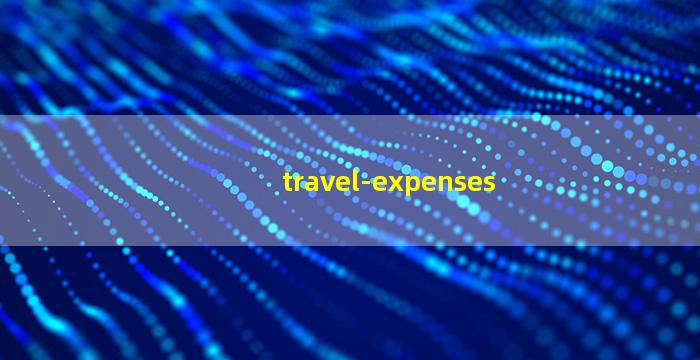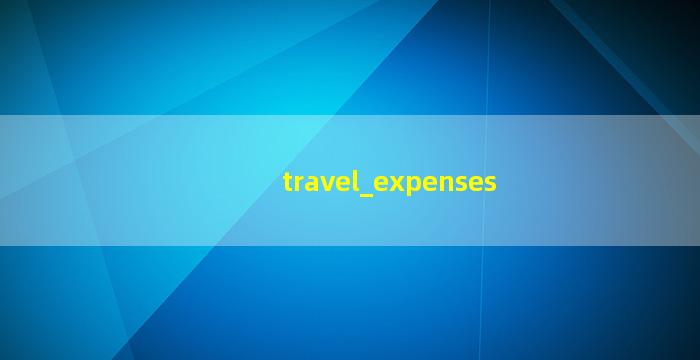旅游费用英语(旅游的费用用英语怎么说)
1、旅游费用英语
Travel Expenses in English
Traveling is an exhilarating experience that allows us to explore new places, discover different cultures, and create lasting memories. However, it is essential to plan our travel expenses wisely to ensure a smooth and enjoyable journey. Here are some useful English phrases related to travel expenses to help you navigate your way:
1. Booking Accommodation:
When booking accommodation, you can use phrases like:
- "How much does a room cost per night?"
- "Do you have any discounts available?"
- "Is breakfast included in the price?"
2. Transportation Costs:
Transportation costs can vary depending on the destination and mode of travel. You can ask:
- "How much is a one-way ticket to [destination]?"
- "Is there a student/senior citizen discount?"
- "Are there any additional fees for baggage?"
3. Dining Expenses:
Experiencing local cuisine is an integral part of traveling. When dining out, you can ask:
- "What's the price range of the menu items?"
- "Are there any special deals or happy hour discounts?"
- "Is service charge included in the bill?"
4. Sightseeing and Activities:
Exploring tourist attractions can sometimes come with entrance fees or additional costs. You can inquire about:
- "How much does the entrance ticket cost?"
- "Are there any package deals available for multiple attractions?"
- "Do you offer any guided tours?"
Remember to keep track of your expenses to stay within your budget. It is also helpful to have some emergency funds in case of unexpected circumstances. By mastering these English phrases related to travel expenses, you will be better equipped to handle and manage your expenses while enjoying your exciting journey.

2、旅游的费用用英语怎么说
旅游的费用用英语怎么说

Traveling is an exciting adventure that allows us to explore new places, experience different cultures, and create lasting memories. However, one important aspect of planning a trip is considering the travel expenses. Understanding how to express the cost of traveling in English can be helpful when communicating with others or making arrangements.
In English, we commonly use the term "travel expenses" to refer to the overall cost associated with a trip. This includes transportation, accommodation, meals, entertainment, and any other miscellaneous costs. When discussing travel expenses, it is important to be precise and clear. Here are some common phrases and vocabulary you can use to talk about travel expenses:
1. Cost of transportation: This includes the money spent on flights, train tickets, bus fares, or rental cars. You can say, "The cost of the flight from London to Paris was quite high."
2. Accommodation expenses: This refers to the cost of staying in a hotel, hostel, or vacation rental. You can say, "The hotel room for two nights cost us $200."
3. Meals and dining: Discussing the cost of food is important when budgeting for a trip. You can say, "We spent around $50 per day on meals and dining."
4. Entertainment: This includes the money spent on attractions, tours, and activities. You can say, "The entrance fee to the museum was $10 per person."
5. Additional expenses: These are the miscellaneous costs such as souvenirs, tips, and other unforeseen expenses. You can say, "We had some additional expenses for souvenirs and taxi rides."
Remember to use appropriate currency and units when discussing travel expenses. It's also helpful to ask about discounts, special offers, or package deals to reduce costs.
Traveling can be a fulfilling experience, but it's important to plan and budget accordingly. Being able to converse about travel expenses in English will not only help you communicate effectively, but also ensure a smooth and enjoyable trip. So, go ahead, explore the world, and don't forget to keep track of your travel expenses!
3、旅游费用的英文怎么说
旅游费用的英文怎么说
Traveling can be a wonderful experience, but it's important to plan and budget for the expenses involved. Knowing how to talk about travel expenses in English can be helpful for communicating with others and making better financial decisions. Here are some key phrases to help you discuss travel costs:
1. Transportation expenses: These include the cost of tickets for flights, trains, buses, or rental cars. You can say, "I need to budget for transportation expenses" or "I'm looking for affordable transportation options."
2. Accommodation costs: This refers to the price of staying in hotels, hostels, or vacation rentals. You can mention, "I need to consider accommodation costs when planning my trip."
3. Food and dining expenses: This includes the money spent on meals, snacks, and drinks while traveling. You can say, "I need to budget for food and dining expenses" or "I'd like to try local cuisine without overspending."
4. Attractions and activities: These are the costs associated with visiting tourist attractions, museums, theme parks, or participating in activities like guided tours or water sports. You can discuss these expenses by saying, "I should factor in the costs of attractions and activities" or "I want to make sure I can afford to do some sightseeing."
5. Miscellaneous expenses: These are the additional costs that may arise during a trip, such as souvenirs, travel insurance, or unexpected emergencies. You can mention, "I need to account for miscellaneous expenses" or "I should have a contingency plan for unexpected costs."
Remember, it's important to plan your travel budget wisely to avoid overspending or running out of money. Doing some research and comparison shopping can help you find affordable options and save money on your trip.

Traveling can be a rewarding experience, but it's essential to be aware of the costs involved. By knowing how to discuss travel expenses in English, you can effectively communicate your needs and make informed financial decisions.
4、旅游费用用英语怎么说
What is the English Word for "Travel Expenses"?
Traveling is a wonderful way to explore new places, experience different cultures, and create lasting memories. However, one important aspect of traveling that cannot be ignored is the travel expenses. So, how do we say "旅游费用" in English?
The English word for "旅游费用" is "travel expenses" or simply "expenses." This term refers to the costs that are incurred during a trip, including transportation, accommodation, meals, attractions, and any other miscellaneous expenses.

When planning a trip, it is essential to consider the travel expenses in order to budget accordingly. Here are some common types of travel expenses:
1. Transportation: This includes the cost of flights, train tickets, buses, taxis, and any other mode of transportation used during the trip.
2. Accommodation: The cost of hotels, hostels, vacation rentals, or any other place you stay overnight.
3. Meals: The money spent on food and drinks throughout the trip, including dining out, snacks, and groceries if you plan to cook.
4. Attractions: The entrance fees or tickets to visit museums, historical sites, amusement parks, or any other places of interest.
5. Miscellaneous expenses: These can include travel insurance, visa fees, souvenirs, tips, and any unexpected costs that may arise during the trip.
It is important to research and plan ahead to get an estimate of the travel expenses for your trip. You can use online travel websites, travel guides, or seek advice from experienced travelers to help you determine the approximate costs.
Remember, travel expenses can vary greatly depending on the destination, season, duration of the trip, and your travel style. It is advisable to set aside some extra funds for unforeseen expenses or emergencies.
So, keep in mind that "旅游费用" is translated as "travel expenses" in English. By considering and managing your travel expenses effectively, you can have an enjoyable and worry-free trip. Happy travels!


.jpg)
.jpg)
.jpg)
.jpg)
.jpg)
.jpg)